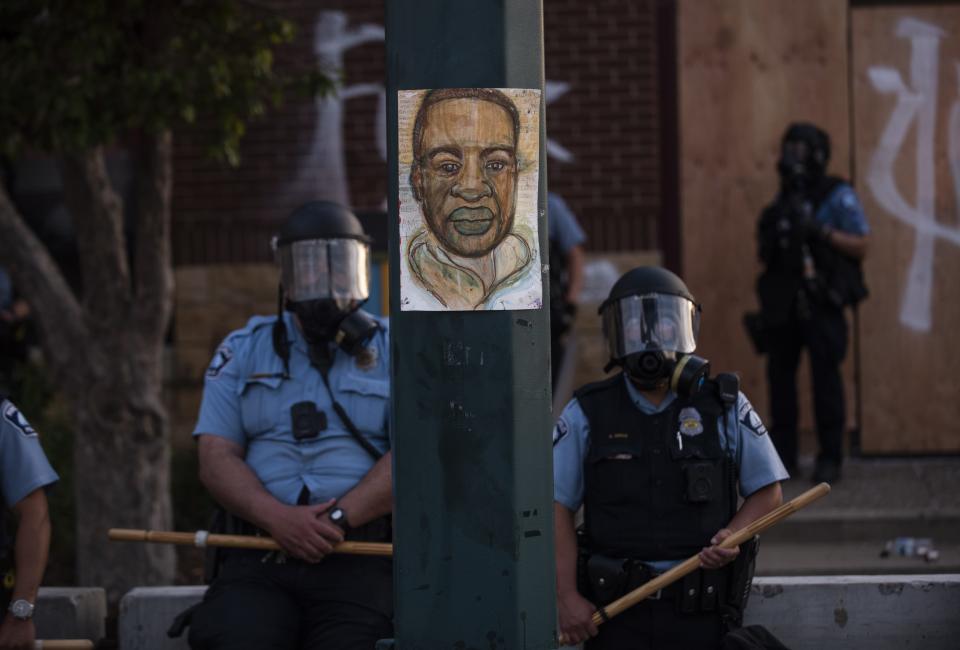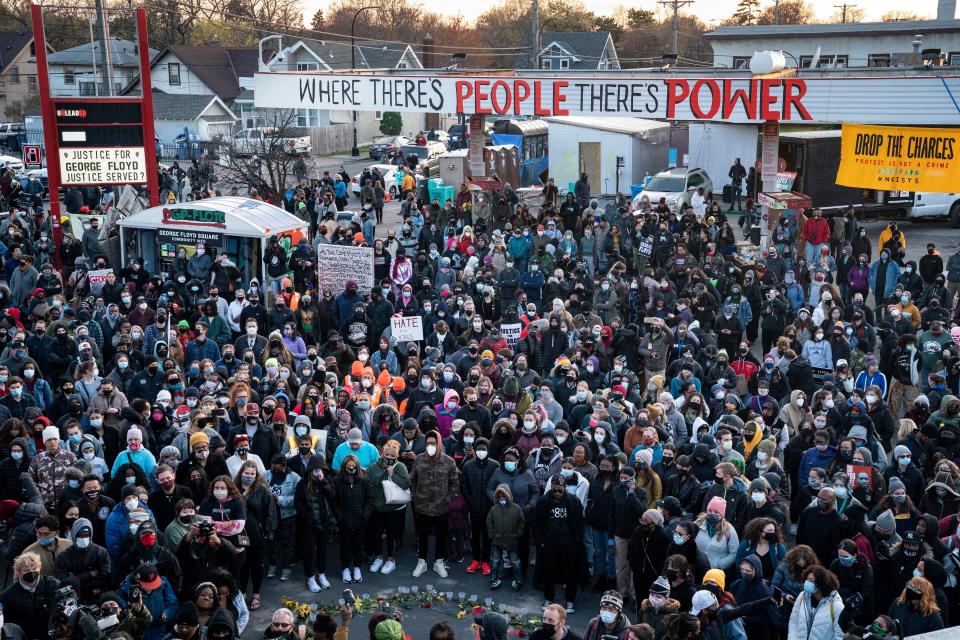Minneapolis Police Department uses 'unreasonable force' after George Floyd's death, Garland says
WASHINGTON – Minneapolis and its police department engage in a pattern of violating people's rights through the unnecessary, unjustified use of deadly force and discrimination, Attorney General Merrick Garland announced Friday after a two-year investigation following George Floyd’s death.
A 92-page Justice Department report found the police:
Use excessive force, including unjustified deadly force.
Unlawfully discriminate against Black and Native American people in its enforcement activities.
Violate the rights of people engaged in speech protected by the First Amendment.
Discriminate along with the city against people with behavioral health disabilities during calls for assistance.
"MPD uses unreasonable force, infringes on First Amendment rights, and discriminates based on race and disability," the report said. "MPD also lacks the systemic safeguards that can prevent or address those abuses, such as effective accountability, rigorous training, robust supervision, and appropriate officer support."
“Such conduct is deeply disturbing and it erodes the community’s trust in law enforcement,” Garland said.
What changes does DOJ recommend for Minneapolis?
The department's recommendations in the report include:
Revising policies to emphasize avoiding using force and improving training for using force.
Requiring supervisors to review the use of force and identify violations of policy or law.
Developing policies appropriate for dealing with people with mental health problems.
Analyzing data about police actions for racial disparities dealing with stops, searches, arrests and use of force, and reducing unjustified disparities.
"For years, MPD used dangerous techniques and weapons against people who committed at most a petty offense and sometimes no offense at all," the report said. "MPD used force to punish people who made officers angry or criticized the police."
DOJ, Minneapolis to negotiate federal court agreement overseeing policing
The Justice Department and city officials have reached an agreement in principle to negotiate a concern decree so that an independent monitor will oversee changes in local policing enforceable in federal court. The decree could take months to negotiate and years to accomplish its goals, officials said.
Minneapolis Mayor Jacob Frey said every level of government and city agency understands change is "nonnegotiable." The city has already hired a new police chief and new city attorney, he said.
“Our success will be defined by people feeling safer when interacting with police in our city,” Frey said. “We are not going to stop until every single person in every single neighborhood and ZIP code feels safe interacting with police.”
“We acknowledge the pain, anger, frustration, fear and sense of vulnerability that many people of our community have endured,” Minneapolis Police Chief Brian O’Hara added. “It is our time to lead, to heal, rebuild and create the kind of police department that every Minneapolis resident deserves.”

How have Minneapolis, police responded already?
The report noted Minneapolis and its police department prohibited neck restraints and no longer use certain crowd control weapons without approval from the police chief. The department banned the use of "no-knock" warrants after the 2022 death of Amir Locke. The city launched a behavioral health response program so that trained mental health professionals will respond to calls for service that do not police.
The Justice Department plans to work collaboratively with the city and police on more reforms to remedy unlawful conduct cited in the report.
“We need help changing and reforming this department,” Frey is quoted as telling investigators. “Clearly, we still have a long way to go.”
George Floyd's murder, other killings spark federal review
Floyd’s death in May 2020 focused worldwide attention on policing and sparked protests. He suffocated when former Officer Derek Chavin held him down, with a knee to Floyd’s throat, for 9 minutes as he protested that he couldn't breathe. Previous shootings by other officers led to outcries in the years before Floyd’s death.
“As I told George Floyd’s family this morning, his death has had an irrevocable impact on the Minneapolis community, on our country and on the world,” Garland said. “His loss is still felt deeply" and "he should be alive today."
In Floyd’s case, the four officers involved in the incident faced state and federal charges. Chauvin was convicted of murder and manslaughter in state court in April 2021 and sentenced to 22.5 years in prison. He pleaded guilty in December 2021 to federal civil rights violations in Floyd’s murder and in holding a 14-year-old boy by the throat, beating him with a flashlight and pressing his knee to the boy’s neck for 15 minutes in 2017.
The three other former officers were convicted in federal court of civil rights offenses. Tou Thao and Alexander Kueng were convicted of willfully failing to stop Chauvin from killing Floyd. All three were convicted of failing to render medical aid.
Thao was sentenced to 42 months in prison, Kueng to 36 months and Lane to 30 months. Thao was also convicted in May 2023 of state charges of aiding and abetting manslaughter. Keung and Lane previously pleaded guilty to those charges.
The city of Minneapolis agreed in April to pay nearly $9 million to settle two police misconduct lawsuits involving the actions of Chauvin years before he murdered George Floyd.
What is Section 242?: What is Section 242? Congress weighs policing change that may alter how we prosecute cops
'Tragic results': DOJ report chronicles violence against restrained suspects
The Justice Department announced in October 2020 – five months after Floyd’s death – offered assistance to the Minneapolis Police Department to review, enhance and reform policies to prevent the use of unnecessary force. Garland announced the inquiry that led to Friday's report in April 2021.
The report was based on thousands of documents, incident files, body-worn camera videos, and city and police data. Investigators also rode along and chatted with police officers, city employees, mental health providers and community members. The findings were disturbing.
"MPD patrolled neighborhoods differently based on their racial composition and discriminated based on race when searching, handcuffing, or using force against people during stops," the report said. "The City sent MPD officers to behavioral health-related 911 calls, even when a law enforcement response was not appropriate or necessary, sometimes with tragic results."

The report portrayed a strained relationship between police and the community. One officer said morale “is at an all-time low.” Hundreds of officers have lef the force since 2020 and recruitment is difficult, leaving 585 sworn officers in May, compared to 892 in 2018.
Besides Floyd's death, the report noted the 2015 police shooting death of Jamar Clark, which triggered 18 days of protests and the occupation of a police precinct station. In 2017, an officer shot and killed Justine Ruszczyk while responding to her 911 call. In 2018, police shot and killed Thurman Blevins after a foot chase.
"These and other deaths have focused the community’s attention on MPD," the report said.
The inquiry depicted horrifying scenes of violence by police on people who were already handcuffed.
In one incident, an officer threw a handcuffed Black man to the ground face first because he “tensed up” during a search. Another time, when a handcuffed white man tried to return to a vacant house, police dragged him down several steps, threw him on his back and the man screamed the officer was “gouging my eye.” Once when a white man experiencing behavior health issues was handcuffed to a stretcher, he spit at an officer, who punched him in the face.
The report found Minneapolis officers frequently use “gratuitous force” when people are already restrained. “It is a ‘completely unnecessary act of violence,’ and it violates the Fourth Amendment,” the report said.
“The findings laid out in today’s report are troubling. I know this community is still hurting and today’s announcement may also open up old wounds,” Associate Attorney General Vanita Gupta said. “The Justice Department is committed to working with Minneapolis.”
Racial reckoning in pictures: Photos show a racial reckoning after George Floyd's death
This article originally appeared on USA TODAY: Minneapolis PD used 'excessive force' after George Floyd's death: DOJ
